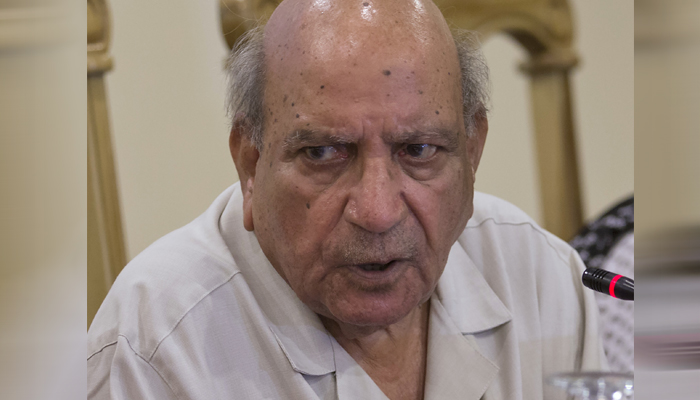Obituary: IA Rehman’s praxis
LAHORE: The man who showed the path for struggle for peoples’ rights and consistently enriched progressive ideals during worst of circumstances peacefully passed away leaving behind an inspiring progressive legacy and a huge void for a subdued civil society to fill.
A man of progressive worldview, professional excellence, creative intellect and unflinching commitment to the cause of secularism, democracy and socialism, he fought against all kinds of oppressions and discriminations and worked for the emancipation of the downtrodden. Being a progressive ‘dervish’, he was admired and respected by both adversaries and admirers because of his polite demeanours, humility, honesty, simplicity and selfless dedication to various causes of the people.
Ibn Abdur Rehman, better known by his columnist name I. A. Rehman, was born in 1930 in Haryana to a Rind Baloch educated family and migrated to Pakistan after graduating and getting his MSc degree from the Aligarh University. Despite his bitter experience of a bloody partition of the Punjab, he never nursed any bitterness, nor showed any enmity towards those who had tormented his family. Inspired by Marxism and progressive democratic ideals, I. A. Rehman turned into a pedagogue of people’s rights. He started his long journalistic career as a film critic and a sub-editor at the most prestigious Pakistan Times. In the inspiring company of his editor Faiz Ahmad Faiz, Rehman made best use of his apprenticeship and turned into a most respectable columnist and he, subsequently, became Editor-in-Chief of the Pakistan Times. He worked for The Viewpoint weekly from its beginning to the end under the stewardship of another brilliant editor Mazhar Ali Khan and wrote his column “Between the Lines” under his pen-name “Linesman”. As a leading columnist, he continued to regularly contribute to Dawn and other newspapers till his last days.
Representing the partition-generation of progressive writers, Rehman sahib, as he was fondly called, played a defining role in the battle of ideas in a post-colonial state that took an authoritarian and retrogressive course. His generation of peoples’ intellectuals consistently and steadfastly stood against successive military dictators and repression and exploitation of the people. Most remarkable was his opposition to the first military dictator Gen Ayub Khan. Later, he was among the few in the West Pakistan who stood against the military operation against the people of East Pakistan by the then military dictator Gen Yahya Khan. Those were the most tragic despondent days when his colleagues from Pakistan Federal Union of Journalists (PFUJ) and comrades from the Left parties were being killed in the then East Pakistan. Being a journalist and a leader of the PFUJ, he became a target of the witch-hunt and was imprisoned for fighting for journalists’ rights and freedom of press during the long reign of Gen Ziaul Haq. He was a role model for successive generations of journalists and civil society activists.
A true tribune of the people who always stood on the right side of history and with the oppressed and disenfranchised peoples of the world, Mr Rehman helped organise India, Pakistan’s People’s Forum for Peace and Democracy and South Asian for Human Rights. He was also one of the founding members of Safma and worked for peace and cooperation in South Asia.
A vanguard of human, civil, social, economic, gender, women and minorities’ rights, Rehman sahib was everywhere and always stood with the people’s struggles. His real inner humanist self found a most remarkable expression when he along with Aziz Siddiquie, a renowned editor of the Frontier Post, and Asma Jehangir founded the Human Rights Commission of Pakistan (HRCP). This was a most rewarding effort since Rehman got his real baptism in setting the agenda of people’s rights and their struggle. Not a textbook theoretician or a dogmatist, Comrade Rehman continued to guide and help the people’s struggles. He wrote thousands of columns, documents, reports and charters to enrich the civil, social and economic rights of the people.
As a leading Marxist and a revolutionary democratic activist, he continued to pursue truth and acquire new ideas while not succumbing to dogmatism or sectarianism. He was a card holder of the Communist Party of Pakistan that he kept as a sacred medal, despite the demise of the united Communist Party of Pakistan. But he could not fit into the sectarian divisions of the Left. A broad-minded person always ready to listen to others and flexible enough to bridge the divides, Rehman continued to evolve both intellectually and as a revolutionary practitioner He was a man of everybody ready to do something tangible for the people.
Above all, what made him so popular with the people of all ages was his polite, pleasant and affectionate manners. He nursed no grievances, nor carried any personal prejudices. Man of simple manners and magical attraction, he was respected by everybody. A great friend indeed, and a guide in whose demise the people of Pakistan have lost a visionary who thought and lived for them. My last tributes to a comrade-in-arms and a sweet friend for over five decades. Goodbye Rehman sahib — rest in eternal peace.
-
 ‘Chinamaxxing’ Explained: Inside Viral Gen Z Trend Taking Over TikTok And Instagram
‘Chinamaxxing’ Explained: Inside Viral Gen Z Trend Taking Over TikTok And Instagram -
 Fears Erupt About Sarah Ferguson Pulling A ‘Harry’ While Sitting On A King’s Ransom: ‘Her Leverage Still Stands’
Fears Erupt About Sarah Ferguson Pulling A ‘Harry’ While Sitting On A King’s Ransom: ‘Her Leverage Still Stands’ -
 Lisa Rinna Slams Andy Cohen For His Below The Belt Move: 'So Shady'
Lisa Rinna Slams Andy Cohen For His Below The Belt Move: 'So Shady' -
 Stunning New Photos Of The Milky Way Shed Light On How Stars Are Formed
Stunning New Photos Of The Milky Way Shed Light On How Stars Are Formed -
 Prince Harry, Meghan Face Fresh Calls To Lose Royal Titles Over ‘pseudo-royal’ Visit
Prince Harry, Meghan Face Fresh Calls To Lose Royal Titles Over ‘pseudo-royal’ Visit -
 Gordon Ramsay On His Basal Cell Carcinoma Diagnosis
Gordon Ramsay On His Basal Cell Carcinoma Diagnosis -
 Fukushima Decommissioning: Japan Deploys Snake-like Robot To Remove Nuclear Debris
Fukushima Decommissioning: Japan Deploys Snake-like Robot To Remove Nuclear Debris -
 Brenda Song Turns Macaulay Culkin's 'Home Alone' Into 'terrible' Lesson: 'Children Have To Be A Little Scared'
Brenda Song Turns Macaulay Culkin's 'Home Alone' Into 'terrible' Lesson: 'Children Have To Be A Little Scared' -
 MrBeast Vows To Book Only Starlink-equipped Flights As Global Airline Adoption Surges
MrBeast Vows To Book Only Starlink-equipped Flights As Global Airline Adoption Surges -
 Kim Jong Un Says North Korea Ready To ‘get Along’ With US But Sets Key Condition
Kim Jong Un Says North Korea Ready To ‘get Along’ With US But Sets Key Condition -
 Andrew Fears What Comes Next As Jeffrey Epstein Scandal Deepens
Andrew Fears What Comes Next As Jeffrey Epstein Scandal Deepens -
 Inside Meghan Markle's 'scary' Postpartum Preeclampsia Journey
Inside Meghan Markle's 'scary' Postpartum Preeclampsia Journey -
 'Sinners' Creator Ryan Coogler's Bombshell Statement Comes To Light After Oscar Nomination
'Sinners' Creator Ryan Coogler's Bombshell Statement Comes To Light After Oscar Nomination -
 Teddi Mellencamp Pens Sweet Message As Daughter Dove Turns 6: 'Love You So Much'
Teddi Mellencamp Pens Sweet Message As Daughter Dove Turns 6: 'Love You So Much' -
 James Hetfield's Health Struggle Amid His 2026 Las Vegas Sphere Residency
James Hetfield's Health Struggle Amid His 2026 Las Vegas Sphere Residency -
 Princess Beatrice, Eugenie Are Now Facing The Same Wait As Their Parents: ‘Their Future Has To Be Decided’
Princess Beatrice, Eugenie Are Now Facing The Same Wait As Their Parents: ‘Their Future Has To Be Decided’




